► We reveal the best hybrid estate cars
► Our recommended petrol-electric wagons
► Why a hybrid estate might be right for you
The best hybrid cars are a smart way to trim your fuel bills without going the full hog and going for an electric vehicle (EV). There are also numerous hybrid estate wagons on the market that use an electric motor to supplement a petrol or diesel engine – and still pack a large boot for ferrying all the clobber of family life.
Whether you need to transport luggage galore, children’s pushchairs or precious pets, there’s a hybrid estate car for you in this list. We’ve split the best hybrid estates into different categories to suit different user needs and budgets. If you’re looking for something larger, why not check out our list of the best hybrid SUVs.
The best plug-in estates at a glance
We have split our recommendations by price, type and size, giving the widest possible mix of wagons that may suit your needs. Simply browse our regularly updated list and see which hybrid estates we rate the highest. One of these could be the perfect stepping stone to going fully electric. And if you need more space, don’t forget to check out our list of the best 7-seater cars or the best hybrid family cars, while those with specialist mobility needs may find our best hybrid Motability cars guide useful.
The best hybrid estate cars in 2025
Skoda Superb iV
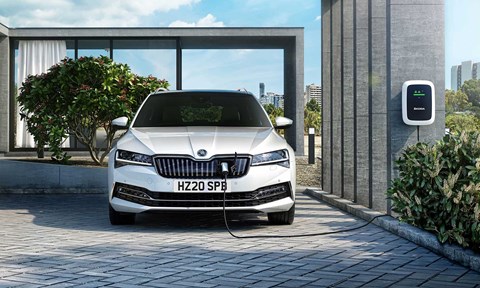
Best for: Those who want room, specs and value
Pros: Huge cabin, big boot
Cons: Arguably underpowered
The Skoda Superb Estate is a perennial favourite of ours: the cabin is echoingly roomy and the boot truly vast. A range of iV plug-in hybrids are now available, although Skoda has been reporting delays on many of its electrified models. If you can find one, you won’t regret it. It mates a 1.4-litre TSI engine with a modest lithium-ion battery and mixes 215bhp punch with parsimony; CO2 emissions are between 27-32g/km, depending on spec, while fuel consumption averages between 198-234mpg. That cavernous loadbay measures a whopping 510 litres (slightly down on the regular Superb’s 660-litre boot).
Read our Skoda Superb Estate review
Volvo V90 hybrid estate
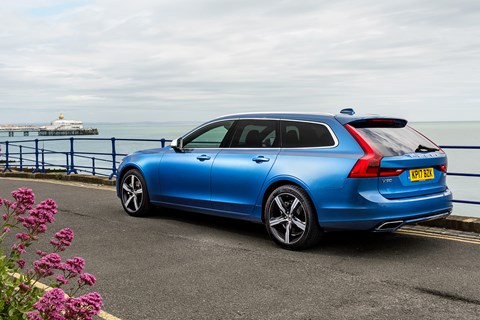
Best for: Those who prioritise safety
Pros: Scandi chic with the luxury and quality to match – also 449bhp
Cons: Pricey but you get what you pay for
The Volvo V90 is another huge – and hugely talented – hybrid estate car. One of the poster children of the Volvo revolution, the V90 brings a dose of Scandi chic to proceedings and looks the business. Slick looks are backed up by a thoughtful, minimalist interior and the usual creature comforts you’d expect from the brand, such as class-leading seats and a cracking stereo. Hybrid models are badged T8 Recharge and they are on the pricey side (RRP starts upwards of £60k these days), but you’ll be rewarded with a 52-mile electric range, CO2 emissions of a startlingly low 19g/km and a brawny chunk of 449bhp thrust. While not quite as boxy as Volvo estates of yore, the V90 PHEV does offer a handy 488 litres of luggage space.
Read our Volvo V90 Estate review
Toyota Corolla Touring Sports
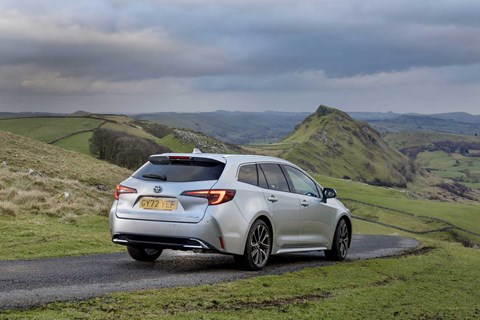
Best for: those looking for value
Pros: One of the cheaper choices, tried and tested tech, reliability
Cons: Not inspiring to look at, or drive
Okay, none of the hybrid estate cars in our list is properly cheap – you’ll have to stray into the secondhand car market to find really affordable prices. But by the standards of the new car market, you /can/ find cheaper petrol-electric wagons if you look hard enough. We rate the Toyota Corolla Touring Sports, a full hybrid that’s taken two decades of Toyota know-how from the Prius and turned it into a sensible estate bodyshell. Prices start at £31,545. The company claims a handy 64mpg and CO2 emissions of between 100-111g/km and because it’s not a plug-in hybrid, those figures should be actually achievable given a light right foot. One nice feature is how you can adjust the boot deck between two heights, letting you choose to have a hidden compartment beneath for valuables or a deeper loadbay for tall objects.
Read our Toyota Corolla Touring Sports review
Suzuki Swace Estate
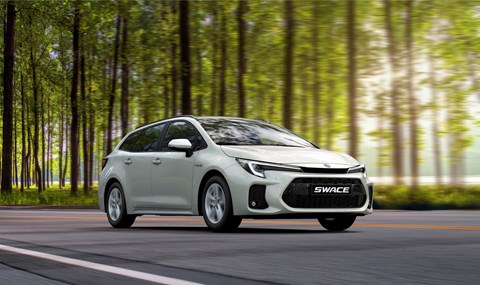
Best for: Those on a tight budget
Pros: It’s the Toyota but even cheaper, it’s a sensible practical choice
Cons: A bit boring
Here’s a clever hack. If you want the same proven Toyota tech in a cheaper package, may we recommend the Suzuki Swace? Available from just £28,999, it’s a badge-engineered Corolla made for Suzuki – and offers a large 595-litre loadbay, 102g/km CO2 emissions and 62.7mpg on the combined cycle. It’s hardly stripped-out, either; even entry-level Motion models come with heated seats, dual-zone climate control and an 8in multimedia touchscreen.
Read our Suzuki Swace review
BMW 330e Touring
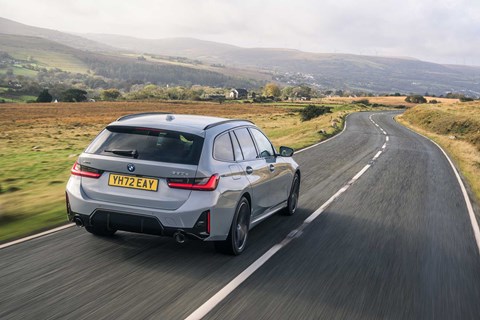
Best for: those looking for a strong all-rounder
Pros: Solid performance, 38-mile zero emissions, solid handling
Cons: Scarce to buy at the moment
Fancy a posher badge on your hybrid estate car? The premium set offer an array of plug-in wagons and one of our favourites is the evergreen 3-series. The 330e Touring is a sweet spot in the Three line-up – a wagon that can do it all, from offering 0-62mph in 5.9sec from its 288bhp powertrain to a claimed 38-mile zero-emissions electric drive around town. You’d barely know this car was a plug-in, apart from its additional fuel filler behind the left front wheelarch and your accountant will thank you for the 30g/km CO2 rating delivered by a 12kWh battery. Just be warned that the chip shortage has meant the Touring estate bodystyle has been in short supply – while BMW still lists the saloon on its UK website, supply of the five-door has been somewhat patchy in recent months. Pounce if you see one.
Read our BMW 330e review
Audi A6 Avant
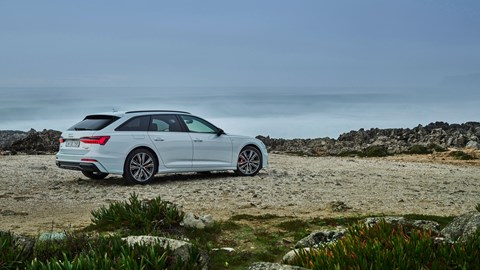
Best for: Those who need more space than a Touring
Pros: Even more space than other cars here. It’s got four-wheel drive too!
Cons: Not the BMW
Step up from a 3-series segment and the class above gives you more of everything: more space, more performance, more battery capacity and, inevitably, more price. The 50 TFSI e Quattro mixes four-wheel drive, a chunky 17.9kWh battery capacity for up to 41 miles of e-range and a 295bhp slug of performance, making this the ultimate all-seasons hybrid estate car. Prices climb to upwards of £58k while the A6 Avant boot promises 405 litres with the rear seats up, 1535 with them folded.
Read our Audi A6 Avant TFSI e review
Seat Leon
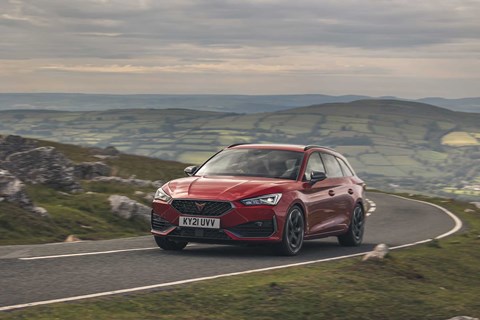
Best for: Those after some performance
Pros: Quick and sharp-handling, 35 miles of EV-only range
Cons: Less boot space than others
The great thing about hybrid estate cars is they come in all shapes and sizes. One of the smaller ones readily available in 2025 is the Cupra Leon e-Hybrid – a way of mixing 243bhp punch with plug-in hybrid parsimony. With a 12.8kWh battery, Cupra claims a range of around 35 miles on electric power, meaning it’ll creep silently around town, yet once you’re on the open road it’ll then dispatch 0-62mph in just seven seconds. Flop the back seats down and you’ll find 1450 litres of luggage space.
Read our Cupra Leon e-Hybrid review
Vauxhall Astra Sports Tourer
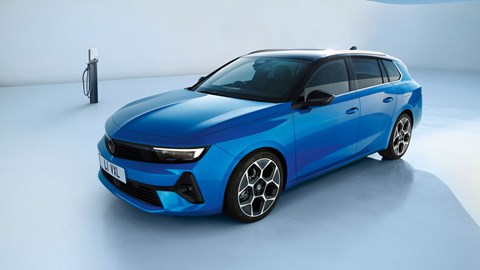
Best for: Those who want something smaller, and very different
Pros: Great looks, even better fuel economy
Cons: Smaller than others here
Another small estate worth a look is the Vauxhall Astra Sports Tourer Hybrid joining the range in the next few months. Priced from £38,485, it’s another plug-in hybrid so you get a 23g/km CO2 rating to trim your tax bills and a typically preposterous 283mpg claimed fuel economy. Pie-in-the-sky figures typical of all PHEVs, but if you do lots of local journeys, these cars are great at keeping costs down. The 1.6-litre petrol engine will keep you going when the battery runs out and the sensibly sized boot will accommodate all the detritus of everyday life.
Read our Vauxhall Astra Estate review
The difference between hybrid estates and plug-ins
One of the key aspects to consider is whether you want a regular hybrid estate car or a plug-in hybrid estate car. The original models on sale were sometimes called full or self-charging hybrids, and their batteries are topped up by kinetic energy harvested during deceleration. You never plug them in – whereas plug-in hybrid electric vehicles (PHEVs) have the facility to top up the battery by charging them in the same way as a full electric car.
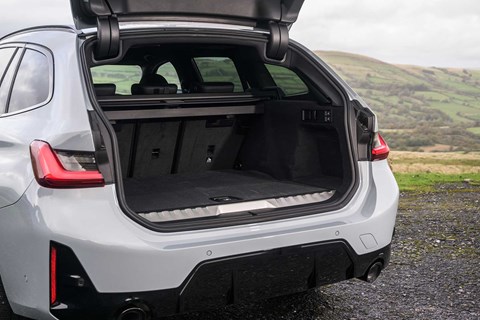
Inevitably, these PHEV estate cars tend to be pricier than a simple petrol or diesel, owing to the extra technology required to allow them to run on electric power. But once you’ve stumped up the extra money in the first place, it should be savings all the way. Battery assistance means that fuel economy is better and emissions are typically lower – the latter bringing the added attraction of reduced company car benefit-in-kind and VED annual road tax.
Just remember that the quoted emissions and fuel consumption figures on a PHEV are wildly optimistic: the WLTP figures are calculated with a fully charged battery, which most typical users will only enjoy first thing in the morning. Still, it’s a great way to lower your tax bill!
Curtis Moldrich is the digital editor of CAR magazine, and has worked on the brand for six years. He’s driven every car in our electric car guides and driven many more hybrid and ICE cars too.